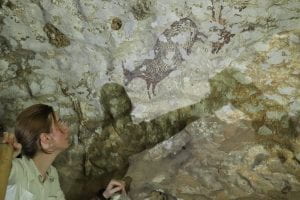There is a stimulating excitement that comes when you are working in the field that you enjoy most. For UNE Alumna Yinika Perston she has found this excitement in the field of archaeology. To illustrate her passion and the joy she finds in the study of artefacts, Yinika described the thrill she feels each time she studies a new stone tool:
“They’re beautiful snapshots of the thoughts and actions of the person who made them, and in some cases these have lasted for hundreds of thousands of years. As Henry David Thoreau wrote, stone artefacts are ‘fossil thoughts’, reminding us of the minds that shaped them.”
Although Yinika is quite passionate and interested in her archaeological pursuits, that wasn’t always been the case. Originally Yinika wasn’t sure what she wanted to study when applying for university, but decided to try something that sounded interesting. Luckily, what she applied for was archaeology, which she quickly discovered she was quite enthralled by.
When Yinika first came to UNE she studied a Diploma in Indigenous Archaeology, which evolved into a combined Bachelor of Arts and Science with honours, majoring in both Zoology and Archaeology. Down the track she also decided to complete a Diploma in Modern Languages at UNE to assist her in learning the Indonesian language.
Following her study journey with UNE, Yinika has continued to follow her passion, which has led to PhD study with Griffith University.

UNE Alumna Yinika Perston with the oldest hunting scene in the world (Leang Bulu’ Sipong 4).
“Since leaving UNE I have been doing as much archaeology as I can,” said Yinika. “I’ve worked excavating and surveying Pre- and Post-contact archaeological sites in and around Sydney, and in the Qld far-west. A big part of my life has been Indonesian archaeology though. I spent half a year studying Indonesian in-country with UNE through the New Colombo Plan, living in the Javanese city of Jogjakarta, after which I then spent another four months in southwest Sulawesi analysing thousands of ice-age stone artefacts from a cave called Leang Bulu Bettue. A year later I went back to Sulawesi, with the same joint Indonesian-Australian team, this time to start a PhD with Griffith University, researching the stone artefact technologies of this archaeologically fascinating region.”
Yinika’s PhD sees her studying stone tools recovered from archaeological sites in Sulawesi, Indonesia – she describes it as her dream to work further with Indonesian archaeologists and communities by exploring their country’s fascinating and extensive archaeological heritage.
As part of her current research Yinika, alongside her fellow UNE Alumna Kim Newman, contributed to a paper that was recently published in Nature (a renowned science and technology journal). Both the paper itself and Yinika’s contribution are truly significant to the archaeological field. Yinika explained the research and her contribution by saying:
“In our recent paper in Nature, the DNA analysis of the 7,200 year old skeleton of a young woman reveals the complex genetic history of the ‘Toalean’ people who lived in Sulawesi about 8-3 thousands years ago. She was found in the cave site of Panninge and given the Bugis name ‘Bessé’ by the Indonesian excavators who first uncovered her. It’s incredibly rare to find a well-preserved skeleton in these conditions, and even rarer to have enough DNA preserved for analysis, but the geneticists were able to determine that Bessé was related to ancestors of the Indigenous Australians, Papuans, and the extinct Denisovan lineages.”
“After Bessé was found I was involved in assessing the thousands of stone artefacts that were also dug up at the excavation. The Toaleans produced elaborate, tiny toothed stone arrowheads. Recognising these and other distinctive artefacts helped us identify her as belonging to the Toalean period, which was later confirmed with radiocarbon dating. While we were doing the analysis I also unexpectedly identified a new tool manufacturing technique, which I got to describe in one of my own publications. All of this was a huge team effort, with dozens of people involved from local and Australian universities, local villages, and government departments, and I’m thankful I could be so closely involved.”
Knowing you are doing what you love is a satisfying notion, however it is also equally comforting when you are able to engage in a field that comes with new and exciting experiences. Yinika described that despite fieldwork frequently being physically taxing and often stressful she appreciates the opportunity to become immersed in different landscapes and cultures and to draw together the threads of the past through archaeology. Yinika also detailed some of the fantastic opportunities she has had while in the field:
“I’ve had some amazing and unexpected experiences, like camping under an eclipse in the middle of the Kimberley region of W.A., to sitting at the guest-of-honour table at a megalithic village watching traditional badik (a traditional dagger) and fire rituals in Sulawesi.”



Recent Comments